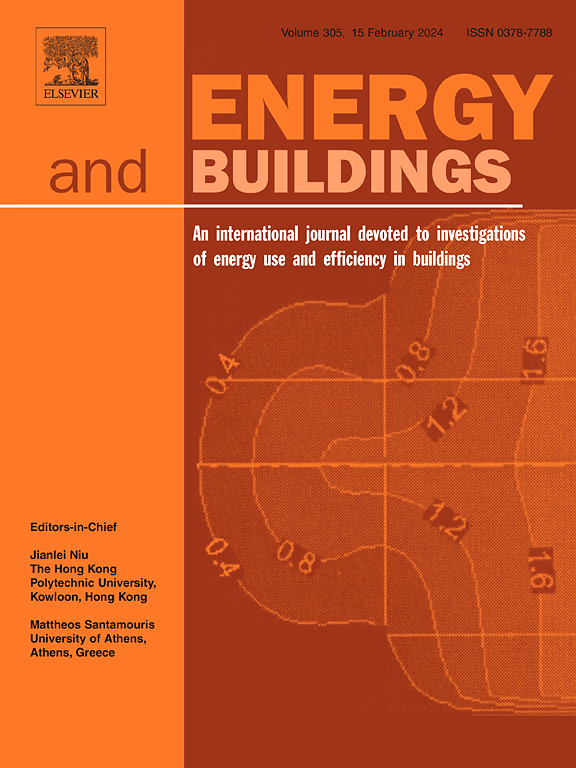基于自适应混合机制模型和基于学习的模型预测控制的太阳能集成建筑能源系统优化调度方法
IF 6.6
2区 工程技术
Q1 CONSTRUCTION & BUILDING TECHNOLOGY
引用次数: 0
摘要
集成太阳能的建筑能源系统作为一种新的可持续能源利用形式,降低了能源消耗,为节能减排提供了很大的灵活性;然而,太阳能供给的随机性和波动性使其难以有效利用,降低了建筑能源系统的经济性。优化调度可以充分协调各设备单元的产量,有效提高能源利用率,进一步提高经济运行;然而,最优调度方法依赖于精确的系统模型,其不确定性和准确性的缺乏阻碍了最优调度方法的有效实施。提出了一种基于自适应混合机制模型(AHMM)和基于学习的模型预测控制(LMPC)的最优调度方法。首先,构建AHMM模型,更准确地描述系统的实际输出,以帮助更有效地实施最优调度方法,其中机制模型用于解释系统的理论输出特性,数据驱动模型用于描述和量化能量耦合的不确定性。其次,提出了一种基于LMPC的最优调度方法,设计了具有动态优化特性的LMPC,解决了太阳能供应波动引起的经济性能下降问题,并通过在线学习机制更新LMPC的预测范围,提高了最优调度的经济性能和计算效率。最后,以一个典型的基于仿真平台的建筑能源系统作为实验对象。结果表明,所提出的AHMM模型具有更高的预测精度和更小的预测误差,所提出的最优调度方法的成本节约和计算效率分别提高了21.09%和17.28%左右。该方法可以量化模型的不确定性,更好地刻画系统响应,在计算机效率不断下降的情况下具有应用潜力和优势。本文章由计算机程序翻译,如有差异,请以英文原文为准。
An optimal scheduling method for building energy system integrating solar energy based on adaptive hybrid mechanism model and learning-based model predictive control
Building energy system integrating solar energy as a new form of sustainable energy use, reduces energy consumption and provides great flexibility for energy saving and emission reduction; however, the stochasticity and fluctuation of solar energy supply makes it difficult to utilize efficiently and reduce the economy of building energy system. Optimal scheduling can fully coordinate the output of each equipment unit, effectively improve the energy utilization rate and further enhance the economic operation; however, optimal scheduling method depends on the accurate system model, and the uncertainty and lack of accuracy hinder the effective implementation of the optimal scheduling method. This paper presents an optimal scheduling method based on adaptive hybrid mechanism model (AHMM) and learning-based model predictive control (LMPC). Firstly, an AHMM is constructed to profile the actual output of the system more accurately to help optimal scheduling methods to be implemented more effectively, in which mechanism model is used to explain the theoretical output characteristics of the system, and the data-driven model is introduced to describe and quantify the uncertainty of the energy coupling. Secondly, an optimal scheduling based on LMPC is proposed, wherein, LMPC with dynamic optimization characteristics is designed to address the economic performance degradation caused by fluctuations in solar energy supply, and the prediction horizon of LMPC is updated by an online learning mechanism to improve the economic performance and computational efficiency of optimal scheduling. Finally, a typical building energy system based on simulation platform is used as the experimental object. The results illustrate that the proposed AHMM has more accurate output and smaller prediction error, and the proposed optimal scheduling method improves the cost saving and computational efficiency by about 21.09% and 17.28% respectively. The proposed method can quantify the uncertainty of the model, better profile the system response, and have application potential and advantage under the situation of the declining computer efficiency.
求助全文
通过发布文献求助,成功后即可免费获取论文全文。
去求助
来源期刊

Energy and Buildings
工程技术-工程:土木
CiteScore
12.70
自引率
11.90%
发文量
863
审稿时长
38 days
期刊介绍:
An international journal devoted to investigations of energy use and efficiency in buildings
Energy and Buildings is an international journal publishing articles with explicit links to energy use in buildings. The aim is to present new research results, and new proven practice aimed at reducing the energy needs of a building and improving indoor environment quality.
 求助内容:
求助内容: 应助结果提醒方式:
应助结果提醒方式:


